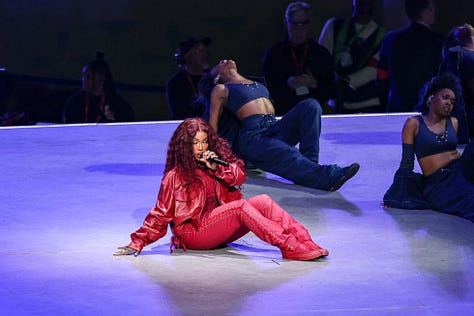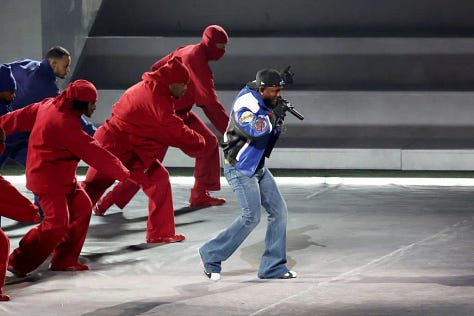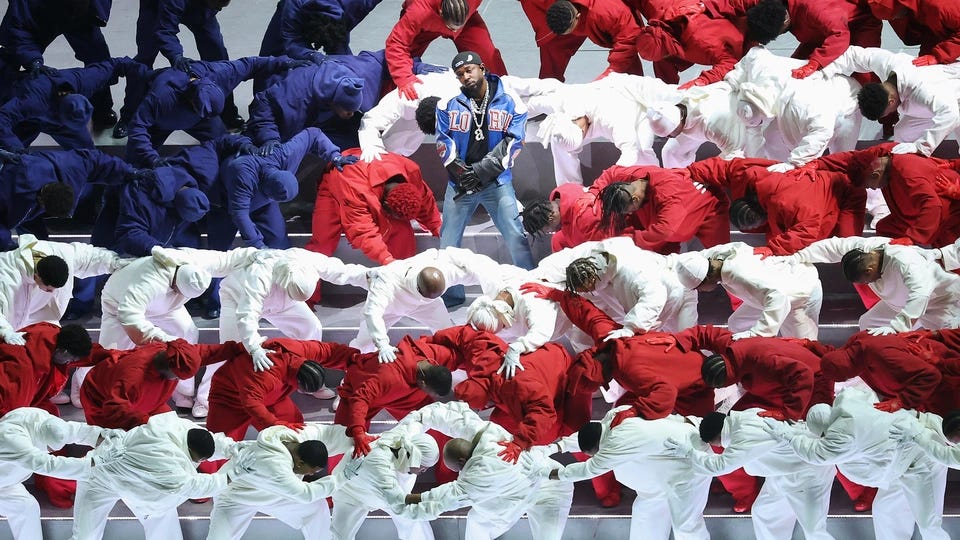In the words of my brilliant brother, Herby Revolus: “There is no such thing as over-intellectualizing art.” In this review, I’m going to dive deep into what we all just witnessed because Kendrick Lamar’s performance at the NFL Super Bowl Halftime Show was more poignant than mainstream media will acknowledge. It was bigger than the rap beef that got him there. When our leaders are telling us that Black and brown folks don’t deserve to occupy important spaces, Kendrick Lamar used his thirteen minutes and twenty-four seconds to say: “fuck that!”
Uncle Sam, played by Samuel L. Jackson, kicks the show off: “This is the great American game!” He narrates the entire performance, reacting to and interrupting Kendrick Lamar. Many people think that having Samuel L. Jackson portray Uncle Sam, a traditionally white character, was some sort of reclamation—a powerful retelling of American history. But Uncle Sam has always been a tool for American propaganda. He represents the U.S. government, the army, patriotism, power; he’s the man who recruits young Black men in high school and gets them to sign their lives away for a country that would otherwise look down on them.
Throughout the performance, Kendrick never wins Uncle Sam over. He calls Kendrick “too loud, too reckless, too ghetto.” He demands that Kendrick Lamar “tighten up” and play the game. I think this portrayal of Uncle Sam is meant to be an Uncle Tom—a Black person who is overly subservient to white people and eager to conform to societal expectations of Black folk. I think this is a crucial part of Kendrick’s message.
Kendrick starts his set with an unreleased song as dozens of dancers emerge out of a Buick GNX. This car—the same car that his parents used to drive him home from the hospital after he was born—symbolizes Kendrick Lamar’s past. Bringing it here to this stage is like a homecoming, bridging the past and present for him to tell this story. It’s as if he was destined to send this message on this night. The dancers coming out of the car feel like they’re parts of him—like these aren’t just dancers on a stage; these are his people. They come from where he comes from; this story is theirs as much as it is his.
“The Revolution’s about to be televised; you picked the right time but the wrong guy,” Kendrick begins. K-Dot is warning audiences: this performance is a wake-up call to his people. While you may see a halftime performance, he is sending a message. I also think “the wrong guy” is a reference to President Trump, who was in the stadium during this performance. Kendrick is saying America chose wrong—the wrong guy. This performance could’ve just been a celebration of Black excellence with a Black woman in office, but now it’s also a call to action.
After Sam tells Kendrick Lamar to “play the game,” he performs his hit song “HUMBLE.” The message here is clear: Black folks (even ultra-successful Black folks performing at the Super Bowl Halftime Show) should be careful not to upset the world with their audacity.
Kendrick is standing on a stage with sixty dancers—all Black men—dressed in red, white, and blue. They’re wearing grillz, skullies, durags; some of them are dancing with locs exposed. They lean on Kendrick as the song starts, forming an American flag with their bodies—reminding everyone that this country was built on the backs of Black people.
When the song starts, the dancers stand upright, stepping apart to reveal the flag broken in half—a people divided. Again, there is so much to unpack here. Kendrick, on the surface—for those willing to look even that closely—is calling attention to the way America is divided—a feeling we are all familiar with during this political climate.
This division is also about Black people and the division felt within the Black community. Kendrick Lamar, who is from Southern California, highlights gang culture with dancers dressed in gang-affiliated colors. At his Juneteenth concert last year—The Pop Out: Ken & Friends—Lamar had members of different gangs dancing together on stage. He’s reminding people that America keeps Black people divided; systemic racism promotes division and violence; that the enemy is not other Black people.
When “Man at the Garden” starts, Lamar is standing at a street corner; the camera pans down to him from above, passing over a man lying atop a streetlight. Some viewers believe this was Lamar’s way of honoring Tyler Sabapathy—a young man from Philadelphia who died last month. Tyler, an 18-year-old student at Temple University, was outside celebrating the Philadelphia Eagles’ NFC Championship win when he fell from a light pole onto the ground. He suffered severe brain injuries and was pronounced dead two days later.
SZA added a necessary softness and warmth to this performance. Both songs SZA performed with Kendrick—“Luther” and “All The Stars”—speak of love and hope. These are messages I think are often left out of revolutionary conversations. Kendrick Lamar’s performance isn’t about victimhood or loss; it’s about love—love for oneself, love for your community, love for Black people. “All The Stars are closer,” SZA coos over and over as dancers march in the street behind her—protesting. It’s as if she’s telling us all to keep fighting—that we are closer to justice and freedom than we may realize.



Uncle Sam jumps in to remind us: “This is what America wants—nice, calm.” Again portraying the model minority—someone afraid to rock the boat—even as a Black man himself he doesn’t understand how radical Black love and joy truly are.
Kendrick Lamar pops up and finally gives the people what they’ve been waiting for: his Grammy award-winning hit diss track “Not Like Us.” Lamar smiles as he looks straight into the camera and says Drake’s name on the biggest stage in the world. The entire stadium—most of which was quiet throughout the performance—suddenly joins in to scream “A MINOOORRRRR” with Kendrick. It’s ironic that this is the song they recognize and want to sing along to—a crowd of mostly rich white people who paid thousands of dollars to see teams of mostly Black men tackle each other for their entertainment don’t even recognize that this song they’re singing along to isn’t just a diss about a famous rapper—it’s also about them. This song is about Donald Trump—the first-ever sitting U.S. President to attend a Super Bowl game—and every culture vulture or consumer of Black media who doesn’t care to understand or love Black people.
When Kendrick finishes partying with Serena Williams (who is getting back at Drake herself) and his longtime collaborator DJ Mustard, the stage goes dark. The words “GAME OVER” flash in front of the crowd.








Love the voice over feature, thank you!